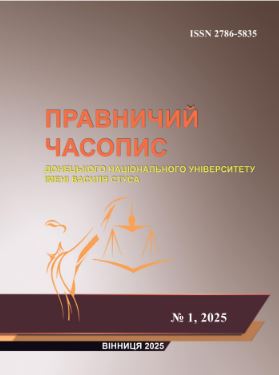Simplified Tax Audits Under the Legislation of Ukraine and Poland
DOI:
https://doi.org/10.31558/2786-5835.2025.1.16Keywords:
simplified tax audit, European practice, camerral audit, legal certainty, tax reporting (return), Supreme Court, tax legislationAbstract
The article examines the procedural aspects of simplified tax audits: 1) Czynności sprawdzające – in accordance with the provisions of the Polish Tax Ordinance (Articles 282–288); 2) Camerral audit – pursuant to the norms of the Tax Code of Ukraine (Articles 75–76, 82). The main characteristics of simplified tax control in the Republic of Poland are identified, namely: a) the limited scope of the audit; b) procedural speed and the absence of a fixed time frame for its conduct; c) the authority granted to tax bodies to make simplified inquiries, both to the taxpayer and to their contractors, in order to clarify data provided in tax returns.
It is substantiated that the Ukrainian counterpart of the Polish simplified tax audit is the camerral audit, which is conducted exclusively within the premises of the tax authority based on data from tax returns and the VAT electronic administration system, without direct contact with the taxpayer or the need for a separate decision or notification by the tax authority. It is clarified that, by its legal nature, this audit represents a form of ongoing documentary control over a taxpayer’s compliance with tax legislation. It is proven that the verification of any additional information or documents, which are not required by law to be submitted along with the tax return, does not fall within the scope of a camerral audit.
If during such an audit the tax authority, based solely on data systems, discovers that the taxpayer has understated tax liabilities, this may serve as grounds for issuing a tax notice-decision with the amount of understated obligations. However, if drawing such a conclusion requires the examination of primary documents that substantiate the figures in the tax return or the accuracy and completeness of tax assessment and payment, the taxpayer may only be audited through a documentary (desk) audit. In studying the timeframes for conducting camerral audits, the absence of a clear definition for the term «other cases» under Article 76.3 of the Tax Code of Ukraine is critically assessed. The article highlights that the application of the general limitation period defined in Article 102 of the Code (1 095 days from the date of tax payment) creates legal uncertainty. Considering the Polish experience, it is proposed to clarify this term by amending the Code with an exhaustive list or typology of applicable situations.
References
Проць І. М., Лепіш Н. Я. Особливості податкової перевірки як форми податкового контролю. Молодий вчений. 2021. № 3. С. 306–309. URL: https://molodyivchenyi.ua/index.php/journal/article/view/468/453
Данілов О. С. Податкові зміни в контексті євроінтеграційних процесів України та їх вплив на бухгалтерський облік. Економіка та суспільство. 2024. № 61. URL: https://www.researchgate.net/publication/380310217_PODATKOVI_ZMINI_V_KONTEKSTI_EVROINTEGRACIJNIH_PROCESIV_UKRAINI_TA_IH_VPLIV_NA_BUHGALTERSKIJ_OBLIK
Добрянська Н. В., Радченко Р. О. Теоретико-правові засади визначення поняття та сутності податкового контролю. Науковий вісник Міжнародного гуманітарного університету. 2024. № 68. С. 18–21. URL: https://vestnik-pravo.mgu.od.ua/archive/juspradenc68/6.pdf
Білоус-Осінь Т. І. Податковий контроль як різновид публічного контролю. Juris Europensis Scientia. 2023. Вип. 3. С. 40–43.
Зінкевич А. В. Світові тенденції здійснення податкового контролю: досвід для України. Інфраструктура ринку. 2020. № 47. С. 180–185. URL: http://market-infr.od.ua/journals/2020/47_2020_ukr/35.pdf
Бурцева О. Є., Власов О. О. Порівняльний аналіз податкових систем країн ЄС. Ефективна економіка. 2017. № 12. URL: http://www.economy.nayka.com.ua/?op=1&z=6011
Швець Ю. О., Завальнюк А. О. Податкові реформи в країнах ЄС: переваги, недоліки їх впровадження в податкову систему України. Європейський вектор економічного розвитку. 2016. № 2. С. 126–134. URL: https://eurodev.duan.edu.ua/images/PDF/2016/2/13.pdf
Носкова М. Адміністративно-правові основи ризикоорієнтованої системи податкового контролю: зарубіжний досвід. Вісник Національного університету «Львівська політехніка». 2020. Т. 7. № 1. С. 107–113. URL: https://science.lpnu.ua/sites/default/files/journal-paper/2020/may/21494/19.pdf
Ustawa z dnia 29 sierpnia 1997 r. Ordynacja podatkowa. URL: Akt prawny
Податковий кодекс України: Закон України від 02.12.2010 р. № 2755-VI. URL: rada.gov.ua
Постанова ВС від 13.102020 р. у справі № 813/7410/14. URL: Єдиний державний реєстр судових рішень
Постанова ВС від 21.01.2021 р. у справі № 813/251917. URL: Єдиний державний реєстр судових рішень
Постанова ВС від 19.04.2022 р. у справі № 816/687/16. URL: Єдиний державний реєстр судових рішень
Постанова ВС від 16.01.2024 р. у справі № 440/2547/22. URL: Єдиний державний реєстр судових рішень
Постанова ВС від 20.11.2019 р. у справі № П/811/1369/16. URL: Єдиний державний реєстр судових рішень
Постанова ВС від 24.05.2022 р. у справі № 280/928/20. URL: Єдиний державний реєстр судових рішень
Постанова ВС від 19.02.2019 р. у справі № 819/1569/16. URL: Єдиний державний реєстр судових рішень
Постанова ВС від 24.07.2023 р. у справі № 821/850/18. URL: https://reyestr.court.gov.ua/Review/112470351
Постанова ВС від 12.08.2021 р. у справі № 240/2549/19. URL: Єдиний державний реєстр судових рішень
Постанова ВС від 17.07.2020 р. у справі № 826/4776/17. URL: Єдиний державний реєстр судових рішень
Постанова ВС від 04.03.2021 р. у справі № 820/3499/17. URL: Єдиний державний реєстр судових рішень

